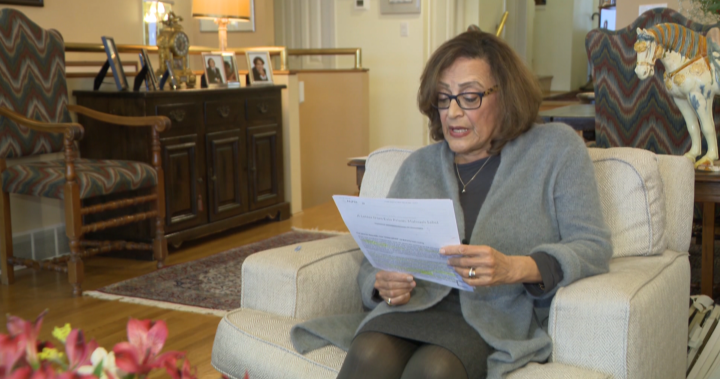It’s been 10 weeks since the Israel-Hamas war began and in that time, Iran has seen an upsurge in atrocities, particularly against minorities.
Some Iranian-Canadians believe the regime is ramping up brutality against its own people as the world’s attention is focused on the Middle East.
“Since October in particular, there has been such an upsurge of violent persecution of the Baha’i community in Iran,” Vancouver resident Chohre Rassekh told Global News.
Rassekh is a Baha’i, belonging to Iran’s largest non-Muslim minority religion — one where your mere existence in Iran is enough to land you in prison.
In Iran, people of the Baha’i faith are denied burial rights, higher education and most jobs. More recently they are also unable to register their marriage.
Iranian law only permits the practice of Christianity, Judaism, Zoroastrianism and Islam.
The systemic persecution of Baha’i is not new, but the Iranian regime has intensified its crackdown and is employing new tactics, with more arrests targeting women and the elderly, violent raids and harsher prison sentences, according to the Baha’i International Community.
Several members of their community were jailed for trying to provide relief to victims of a recent earthquake, which “the rest of the world would consider to be a social action,” Rassekh said.
“They had been taken away on accusation that they are working against the government,” she added.
Three Baha’is in northern Iran were recently sentenced to collectively more than two years in prison for operating a daycare, according to the the Baha’i International Community.
It says since October at least 40 Baha’is in Iran have been arrested and dozens of homes have been raided.
Get the latest National news.
Sent to your email, every day.
“They are raiding the house in a very violent way at gunpoint to enter the homes of the Baha’is,” Rassekh said.
Human rights experts say the persecution of Baha’is is the litmus test for what will follow next in Iran.
Since the start of the Israel-Hamas war the number of state executions has increased to more than three people a day according to non-profit Iran Human Rights.
“November, we have 115 executions and October 80 for executions,” said Mahmood Amiry-Moghaddam, the founder of Iran Human Rights.
Moghaddam said that Iran has staged 32 hangings so far in December. That includes the execution of a juvenile and 22-year-old Milad Zohrevand, the eighth protester linked to the Women, Life, Freedom movement to face the death penalty for participating in the nationwide anti-regime protests that erupted across Iran last year following the death of Mahsa Amini.
In October the United Nations condemned the Iranian regime for carrying out executions at an “alarming rate.”
“Normally, these executions would have led to international outrage … unfortunately, we didn’t see strong reactions,” Amiry-Moghaddam said.
On Dec. 20, Iran executed a 29-year-old woman who, according to Amiry-Moghaddam, was a child-bride victim. He says she was on death row for murdering her husband when she was 19 years old.
Rassekh is asking the world to pay attention.
“We have the right to a decent life to have civil rights,” she said.
To illustrate her point, Rassekh read from a letter written by Mahyash Sabet, an Iranian Baha’i woman serving a second 10-year prison sentence for her religious beliefs. Sabet, a former member of the Baha’i community’s leadership group, wrote from Tehran’s notorious Evin prison.
“For 45 years, we Baha’is have been constantly disqualified from leading a normal life in our ancestral homeland,” she read from the letter.
Sabet’s letter goes on to state that since Iran’s 1979 Islamic Revolution, people of her faith have become ‘the other.’
“I feel very moved every time I read it. I feel extremely moved,” Rassekh said of the letter.
The message behind Sabet’s letter is for all Iranians to stand united in their struggles.
While Rassekh watches the news unfold from afar, she beleives her pain is one with all Iranians fighting injustice.
© 2023 Global News, a division of Corus Entertainment Inc.


